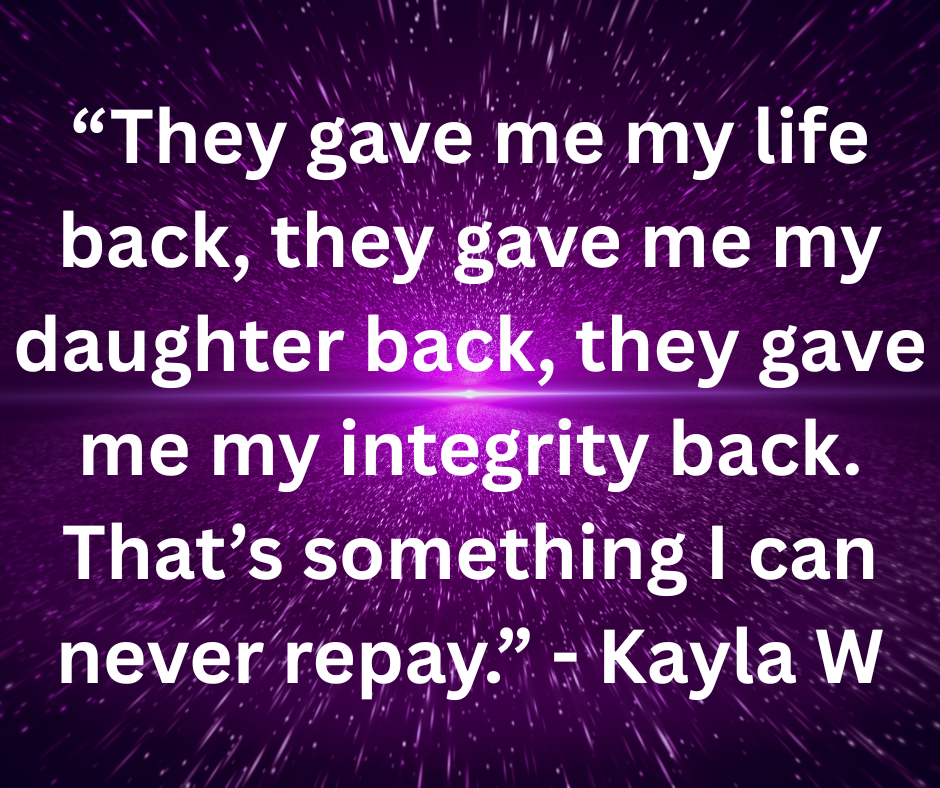
Welcome to a deeper exploration of a topic we touched upon in our latest podcast episode, Podathon For Recovery: Kayla W’s Road to Recovery. In this episode, we heard Kayla's powerful and inspiring story of overcoming addiction. Her journey highlighted the crucial, often devastating, link between unresolved childhood trauma and substance abuse. This blog post expands on Kayla’s experiences, offering further insights into the intersection of trauma and addiction and emphasizing the importance of addressing trauma as a key component of successful recovery.
The Intersection of Trauma and Addiction
The connection between childhood trauma and addiction is a well-documented phenomenon. Adverse Childhood Experiences (ACEs), which include various forms of abuse, neglect, and household dysfunction, can have a profound and lasting impact on a person's physical and mental health. Studies have shown that individuals with higher ACE scores are significantly more likely to develop substance use disorders later in life. Trauma fundamentally alters brain development, particularly in areas responsible for emotional regulation, impulse control, and stress response. This altered brain chemistry can make individuals more vulnerable to seeking relief from emotional pain through substances, initiating a cycle of addiction.
Trauma doesn't just increase the risk of addiction; it also shapes the nature of it. For many, addiction becomes a coping mechanism, a way to numb overwhelming feelings of pain, anxiety, and fear. It’s a desperate attempt to self-medicate and find temporary relief from the enduring effects of past trauma. However, this reliance on substances ultimately exacerbates the problem, creating a vicious cycle of dependence and further damaging mental and physical health.
Kayla's Early Life: Loss, Instability, and Abuse
Kayla's story is a stark illustration of how adverse childhood experiences can pave the way for addiction. From a young age, she faced a series of traumatic events that disrupted her sense of safety and security. Loss was an early and recurring theme in her life. The absence of stable parental figures, coupled with a chaotic home environment, created a climate of constant uncertainty. Children thrive on stability and predictability; when these are absent, the developing brain struggles to cope, leading to emotional and behavioral challenges. Kayla experienced instability and abuse, creating deep emotional wounds that would later contribute to her struggles with addiction. These early experiences laid the foundation for a life marked by pain and a desperate search for escape.
Kayla's early life challenges reflect common ACEs. Exposure to household dysfunction, witnessing substance abuse, and experiencing emotional neglect all contribute to a toxic stress environment for a child. Toxic stress disrupts healthy brain development, impairs the immune system, and increases the risk of a multitude of health problems, including addiction.
The Onset of Addiction: A Coping Mechanism
For Kayla, like many others, substance use began as a means of coping with the intense emotional pain stemming from her early trauma. Alcohol and drugs offered a temporary escape from the overwhelming feelings of sadness, anger, and fear that haunted her. The numbing effect of these substances provided a brief respite from the constant turmoil within. This is a common pattern in individuals with trauma histories; substances become a readily available tool for managing unbearable emotions. What starts as occasional use can quickly spiral into dependence as the brain increasingly relies on these substances to regulate emotions.
It's important to understand that addiction, in this context, is not simply a matter of poor choices or lack of willpower. It’s a complex interplay of biological, psychological, and social factors, with trauma serving as a significant catalyst. The early onset of substance use often reflects the depth of the underlying pain and the individual's limited access to healthy coping strategies. Without intervention and support, this pattern can solidify, leading to a life dominated by addiction.
The Escalation: Dependence, Homelessness, and Alcohol Abuse
As Kayla's substance use escalated, so did the consequences. Dependence took hold, and she found herself increasingly unable to function without alcohol. Her life spiraled downward, leading to homelessness and further instability. This is a common trajectory for individuals struggling with addiction; what begins as a means of escape quickly becomes a destructive force that consumes every aspect of their lives. The cycle of dependence, withdrawal, and relapse traps individuals in a relentless struggle, making it increasingly difficult to break free.
Homelessness, in particular, exacerbates the challenges of addiction. The lack of stable housing, coupled with exposure to violence and other dangers, creates an environment that fuels further substance use. It becomes a desperate cycle where the need to survive overshadows any hope of recovery. For Kayla, this period marked a profound low point, highlighting the devastating impact of addiction on both the individual and their loved ones.
A Moment of Clarity and the First Attempt at Rehab
Despite the depths of her struggles, Kayla experienced a moment of clarity that sparked a desire for change. Recognizing the destructive path she was on, she made the courageous decision to seek help and entered a rehabilitation program. This first attempt at rehab was a significant step forward, demonstrating her willingness to confront her addiction. However, as Kayla's experience illustrates, detox alone is often insufficient to address the underlying issues that drive addiction, especially in individuals with a history of trauma. Without addressing the root causes of her substance use, Kayla was vulnerable to relapse.
Detoxification is an essential first step in the recovery process, but it only addresses the physical dependence on substances. It doesn't address the emotional and psychological factors that contribute to addiction. For individuals with trauma histories, comprehensive treatment is essential, focusing on both the addiction and the underlying trauma. This includes therapy, support groups, and other interventions that help individuals process their traumatic experiences and develop healthy coping strategies.
The Relapse and the DUI: A Fateful Turning Point
Unfortunately, Kayla's first attempt at rehab was followed by a relapse, a common occurrence in the recovery process. However, this relapse led to a fateful turning point: a DUI arrest. This event, fraught with potential consequences, served as a wake-up call. The fear of losing her daughter, coupled with the realization of the harm she was causing to herself and others, motivated her to seek help again, this time with a deeper understanding of the challenges ahead.
While relapse is a setback, it's not necessarily a failure. It's an opportunity to learn from past mistakes and adjust the treatment plan. The key is to view relapse as a temporary detour rather than a dead end. The DUI incident forced Kayla to confront the severity of her addiction and the potential consequences of her actions. This experience proved to be a catalyst for change, driving her to seek more comprehensive and sustained support.
Finding Refuge: Sister's House and the Power of Structure
Kayla's journey took a positive turn when she found refuge at Sister's House, a sober living program provided by Rage Against Addiction. This structured environment provided her with the support, accountability, and routine she desperately needed. The program emphasized regular meetings, sponsorship, and a structured daily schedule, all of which contributed to her stability and growth. Sister's House offered Kayla a safe and supportive community where she could focus on her recovery without the distractions and temptations of her previous environment.
Sober living programs play a vital role in the recovery process, particularly for individuals transitioning from inpatient treatment to independent living. These programs provide a bridge between the structured environment of rehab and the challenges of everyday life. The emphasis on routine, accountability, and peer support helps individuals maintain their sobriety and develop the skills necessary to navigate life without substances.
From Resident to Leader: Kayla's Growth and Compassion
As Kayla progressed in her recovery, she began to take on leadership roles within Sister's House, eventually becoming a house manager. This transition from resident to leader reflects her remarkable growth and newfound sense of responsibility. Guiding others provided a sense of purpose and empowerment, reinforcing her own commitment to recovery. Kayla learned to lead with compassion, drawing upon her own experiences to support and mentor other women on their recovery journeys.
The act of helping others is a powerful tool in the recovery process. It not only provides a sense of purpose but also reinforces one's own sobriety. By sharing their experiences and offering support to others, individuals in recovery can strengthen their commitment to a substance-free life.
Helping Others: Working in Treatment and Opening a Women & Children's House
Kayla's commitment to helping others extended beyond Sister's House. She began working at a local treatment center, Achieve, assisting other women in accessing sober living and recovery supports. Kayla also played a pivotal role in opening a women and children’s house, providing a safe and supportive environment for mothers in recovery and their children. These initiatives demonstrate her unwavering dedication to supporting others on their path to sobriety.
Kayla's work in the field of addiction treatment underscores the importance of peer support and lived experience. Individuals who have personally struggled with addiction can offer unique insights and understanding that professionals may not possess. Their presence can inspire hope and demonstrate that recovery is possible, even in the face of significant challenges.
Rebuilding Life: Co-Parenting, Trust, and Balance in Recovery
Recovery is not just about abstaining from substances; it's about rebuilding a life that is worth living. For Kayla, this involved rebuilding trust with her family, co-parenting her daughter, and finding balance in her life. These are all essential components of long-term recovery, as they address the underlying issues that contributed to the addiction in the first place. Rebuilding relationships, establishing healthy routines, and pursuing meaningful activities are all vital steps in creating a fulfilling and sustainable life in recovery.
Co-parenting, in particular, can be a challenging but rewarding process for individuals in recovery. It requires open communication, mutual respect, and a shared commitment to the well-being of the child. Rebuilding trust with family members can take time and effort, but it's an essential step in healing the wounds caused by addiction.
Rage Against Addiction: A Beacon of Hope
Kayla's story is closely intertwined with Rage Against Addiction, the organization that provided her with the support and resources she needed to overcome her addiction. Rage Against Addiction is a beacon of hope for individuals and families struggling with addiction, offering a range of services, including sober living programs, support groups, and educational resources. Their commitment to providing comprehensive and compassionate care is making a significant difference in the lives of countless individuals and families.
Resources for Support: Where to Find Help
If you or someone you know is struggling with addiction or the effects of trauma, it's important to know that help is available. Numerous resources can provide support and guidance, including:
- Rage Against Addiction: Offers sober living programs and support services.
- Ashley Addiction Treatment: Provides a range of treatment options.
- Achieve Treatment Center: Where Kayla currently works, offering support to women seeking recovery.
- WIC (Women, Infants, and Children): Offers nutrition support for mothers and children.
- Crisis Hotlines: Provide immediate support during times of crisis.
- AA/NA ("90 meetings in 90 days"): Offers peer support and guidance.
Remember, you are not alone, and help is available. Don't hesitate to reach out and take the first step towards recovery.
The Importance of Addressing Trauma in Addiction Recovery
Kayla's story underscores the critical importance of addressing trauma in addiction recovery. Trauma is not just a contributing factor to addiction; it's often the root cause. Without addressing the underlying trauma, individuals are at a higher risk of relapse and continued suffering. Trauma-informed care, which recognizes the impact of trauma and incorporates that understanding into treatment, is essential for promoting healing and long-term recovery. This approach involves creating a safe and supportive environment where individuals can process their traumatic experiences and develop healthy coping strategies.
Therapies such as Eye Movement Desensitization and Reprocessing (EMDR) and Trauma-Focused Cognitive Behavioral Therapy (TF-CBT) have been shown to be effective in treating trauma. These therapies help individuals process their traumatic memories and reduce the emotional distress associated with them. In addition to therapy, support groups and peer support can also play a vital role in the healing process. Sharing experiences with others who have faced similar challenges can provide a sense of community and reduce feelings of isolation.
In conclusion, Kayla's journey from childhood trauma and addiction to a life of recovery and service is a testament to the power of resilience, support, and addressing the underlying trauma. Her story, as shared in our recent episode, serves as a beacon of hope for others struggling with similar challenges. By understanding the intersection of trauma and addiction and providing comprehensive, trauma-informed care, we can help individuals like Kayla break free from the cycle of addiction and build fulfilling lives in recovery. Remember, recovery is possible, and help is available.










